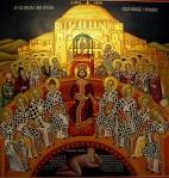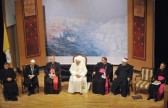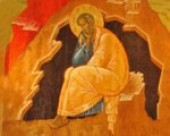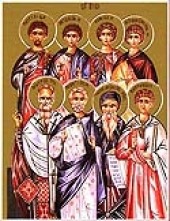You are currently browsing the daily archive for July 10, 2010.
See also: Sunday of the Blindman and Those who assert that they can see!
St. Nikodimus the Hagiorite – of the Holy Mountain on:
“Weak Faith”
(taken from: “What God has done for our Salvation”)
Faith is a power that dwells in the mind and the will of a man. The mind is enlightened by heavenly light and contains that which the Lord reveals to it. The will is likewise moved by God to the fulfillment of every good thing that the mind commands it to do. When faith is weak, the mind cannot understand the mysteries of God, and even before the mind understands them the will has no desire to love them. Blessed Augustine said that man can love what is invisible to him, but not what is unknown. This we see in those Christians who consider themselves believers, not because they live according to the teachings of Christ, but only because they were born of Christian parents and were baptized. In actuality they feel the greatness of the Mysteries very little, and know still less of the essence of our faith and how it differs from other religions. In this condition they differ very little from unbelievers.
I now ask every Christian: who are you, that you stand here in the church? Only by your name can I tell that you are a Christian, this being indicated by nothing else. If someone asks you who Christ was, in Whom you believe, it becomes apparent that you are unable to say anything intelligible. Thus, it is correct to say that in our days the faith of Christians has diminished, as the prophet David also said: Truths have diminished from the sons of men (Ps. 11:1); for even if they believe in the Mysteries of the Church, their faith is so confused, so cold and weak, that we can confidently say that they know them like the blind man who saw people like trees: I see men as trees, walking (Mark 8:24).
God was born in a cave and laid in a manger of dumb beasts in order to teach us not to be enamored of transitory good things. God lived for thirty years in a carpenter’s workshop, plying this trade Himself, that we might learn humility. God walked the streets of Jerusalem that He might show us the road leading to Heaven. God suffered on the Cross in order to destroy sin. Yet all of this does not touch the conscience of Christians and does not cause their hearts to tremble. And so I again repeat what I have just said: truths have diminished from the sons of men. Like truth, faith has also diminished among contemporary Christians, for their faith ought not to be simply rules for “what to believe,” but also rules for “what to do.” It should not merely consist of our believing correctly, but of our living according to our faith: Faith without works is dead (Jas. 2:26). Those who confess Christ to be the Teacher of the faith, the Mysteries, and the dogmas that He has revealed to us, nevertheless do not apply His law to their own lives. And though they hear from His lips that blessed are those who suffer for others, who refrain from pleasures, and who forgive the disgraces and offenses inflicted on them, in spite of this they transgress every commandment of God and the divine teaching of Christ, saying in their hearts: “All of this is true in relation to God, but not to the world.” Thus these unhappy ones believe that by this they will indeed be justified at the Judgment of the incarnate Wisdom of God. The faith of such people is like an amalgam of gold, which in its outward appearance is very similar to real gold, until it is thrown into a fire: then the real gold (if there was any) remains, while the mercury evaporates. So also with these people: they follow after the Divine Teacher only until they have to struggle with the passions. When the time for this arrives they leave Him to Himself. When Jesus Christ commands them to wage war with their passions and overcome them, they immediately renounce His teaching and “turn back.”
All evil comes from weak faith. Feebleness and dwindling of faith lead to the destitution of virtue and the enriching of evil. How deprived contemporary Christians are of the great wealth of the virtues that were so abundant in the first centuries of Christianity! Love for God was then so fervent that many Christians of their own free will gave themselves over to the persecutors of the faith for torture; indeed, at times there were not enough executioners to put them all to death. Love for one’s neighbor was likewise so ardent in these blessed ones that Clement of Alexandria wrote that he knew Christians who not only sold their property in order to give alms, but even sold themselves into slavery, only that they might be able to help their brothers.
Can the faith of ancient and contemporary Christians be compared? Truly, all contemporary evil comes from weakness of faith. If one cuts the branches from a tree, they may grow back; but if the root is cut the tree quickly dies. What the root is to the tree, faith is to the soul. It nourishes the soul and enables it to grow and bear fruit, and for this reason is called the root of immortality. If a Christian lives, he lives by faith, as says the Apostle Paul: The just shall live by faith (Rom. 1:17). Though such a man should come under attack from all the powers of hell, he will easily be able to put them to flight. With the help of faith man achieves perfection in the virtues. If, however, the root of faith is cut, not only do the fruits, that is, the virtues, quickly die, but also the leaves – that by which a Christian is outwardly distinguishable from other people.
When the Apostle Peter was walking upon the water and began to sink, he considered the strong wind the cause of this: When he saw the wind boisterous, he was afraid (Matt. 14:30). The Lord, however, told him that the cause was his lack of faith: 0 thou of little faith, wherefore didst thou doubt? So also Christians consider temptations, the cause of all their evil deeds and of their evil lives. The true cause of their unseemly deeds is that their faith is poor and weak, for if it were not the devil could not have so terribly enslaved them to sin.
The falcon who is born free, who is accustomed to fly in the pure and open air, and who has tremendous power in his beak and talons – how can he endure being controlled, prodded with a stick, and held in captivity? Will he not defend himself with beak and talon? So also the Christian who knows that sin is repugnant to God and worse than any calamity, and who confesses that the God – man Jesus was crucified in order to destroy sin – how can such a Christian sin? Many Christians think that sin is a childishly innocent evil, and not especially great. They not only consider it a lesser evil, but even make fun of it, some even boasting of the shameful sins they have committed. They are not afraid to sin, and constantly add sin to sin. We, however, just as we would fear to fall asleep at night if there were a snake in our bed, so let us also fear sin, and let us pray to Jesus Christ that He make strong our infirm faith.



 Christian Dogma
Christian Dogma Christian Martyrs
Christian Martyrs Christian Orthodox Churches and Monasteries
Christian Orthodox Churches and Monasteries Christian Sermons and News
Christian Sermons and News Church's Teachings on Fasting
Church's Teachings on Fasting Ecumenism – a Great Heresy
Ecumenism – a Great Heresy Father George Calciu
Father George Calciu Life_a Sacred Gift form God
Life_a Sacred Gift form God Orthodox Saints and Church Fathers
Orthodox Saints and Church Fathers Spiritual Elders
Spiritual Elders Daily Bible Readings
Daily Bible Readings Journey to Orthodoxy
Journey to Orthodoxy Listen to Ancient Faith Radio
Listen to Ancient Faith Radio Orthodox Calendar of Feasts and Saints
Orthodox Calendar of Feasts and Saints Orthodox Christian Mission Center
Orthodox Christian Mission Center Orthodox Institute
Orthodox Institute OrthodoxChristianNetwork TV
OrthodoxChristianNetwork TV
Recent Comments